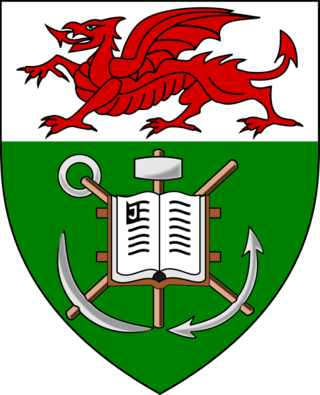
The University of Warwick is a public research university on the outskirts of Coventry between the West Midlands and Warwickshire, England. The university was founded in 1965 as part of a government initiative to expand higher education. The Warwick Business School was established in 1967, the Warwick Law School in 1968, Warwick Manufacturing Group (WMG) in 1980, and Warwick Medical School in 2000. Warwick incorporated Coventry College of Education in 1979 and Horticulture Research International in 2004.

The University of New England (UNE) is a public university in Australia with approximately 22,500 higher education students. Its original and main campus is located in the city of Armidale in northern central New South Wales. UNE was the first Australian university established outside a capital city.

Aston University is a public research university situated in the city centre of Birmingham, England. Aston began as the Birmingham Municipal Technical School in 1895, evolving into the UK's first college of advanced technology in 1956. Aston University received its royal charter from Queen Elizabeth II on 22 April 1966.

The University of Strathclyde is a public research university located in Glasgow, Scotland. Founded in 1796 as the Andersonian Institute, it is Glasgow's second-oldest university, having received its royal charter in 1964 as the first technological university in the United Kingdom. Taking its name from the historic Kingdom of Strathclyde, it is Scotland's third-largest university by number of students, with students and staff from over 100 countries.

Swansea University is a public research university located in Swansea, Wales, United Kingdom. It was chartered as University College of Swansea in 1920, as the fourth college of the University of Wales. In 1996, it changed its name to the University of Wales Swansea following structural changes within the University of Wales. The title of Swansea University was formally adopted on 1 September 2007 when the University of Wales became a non-membership confederal institution and the former members became universities in their own right.

Cardiff University is a public research university in Cardiff, Wales. It was established in 1883 as the University College of South Wales and Monmouthshire and became a founding college of the University of Wales in 1893. It merged with the University of Wales Institute of Science and Technology (UWIST) in 1988 as the University of Wales College, Cardiff. In 1997 it received degree-awarding powers, but held them in abeyance. It adopted the operating name of Cardiff University in 1999; this became its legal name in 2005, when it became an independent university awarding its own degrees.

Southern Cross University (SCU) is an Australian public university, with campuses at Lismore and Coffs Harbour in northern New South Wales, and at Coolangatta, the most southern suburb of the Gold Coast in Queensland. In 2019, it was ranked in the top 100 young universities in the world by the Times Higher Education World University Rankings.

Cranfield University is a British postgraduate-only public research university specialising in science, engineering, design, technology and management. Cranfield was founded as the College of Aeronautics (CoA) in 1946. Through the 1950s and 1960s, the development of aircraft research led to growth and diversification into other areas such as manufacturing and management, and in 1967, to the founding of the Cranfield School of Management. In 1969, the College of Aeronautics was renamed the Cranfield Institute of Technology, was incorporated by royal charter, gained degree awarding powers, and became a university. In 1993, it adopted its current name.

Bocconi University is a private university in Milan, Italy. Bocconi provides education in the fields of economics, finance, law, management, political science, public administration and computer science. SDA Bocconi, the university's graduate business school, offers MBA, Executive MBA, and DBA programs.

Cardiff Metropolitan University, formerly University of Wales Institute, Cardiff (UWIC), Athrofa Prifysgol Cymru, Caerdydd (APCC) and commonly referred to as Cardiff Met, is a university located in the city of Cardiff.

Birmingham Business School(BBS) is the business school of the University of Birmingham in England. Originally established as the School of Commerce in 1902, Birmingham Business School is the oldest business school in the United Kingdom.

Durham University Business School is the business faculty of Durham University, located in Durham, England. Established in 1965, it holds triple accreditation from AACSB, AMBA and EQUIS. The faculty contains the departments of accounting, economics, finance, and management and marketing, as well as twelve research centres.

Cardiff Business School is the business school of Cardiff University in Cardiff, Wales. It was created in its current form in 1987 and opened by Elizabeth II. Cardiff Business School currently serves 3,000 students a year, 700 of whom are postgraduate students. The school's research programme is Economic and Social Research Council (ESRC) recognised and has 140 PhD students currently studying within the school. Its research informs organisations such as the Foreign and Commonwealth Office, the United Nations, HM Treasury, the Department for Business, Innovation and Skills and the Department for Communities and Local Government and working on consultation projects for blue-chip, global firms.
The School of Public Policy and Administration at Carleton University (SPPA) is the public policy school of Carleton University in Ottawa, Ontario, Canada. Established in 1953, it is Canada's oldest graduate school in the field of policy studies and public management. Since its establishment, it has produced several prominent leaders within the Canadian public and non-profit sectors, and has led research activities in this area.

The University of South Wales is a public university in Wales, with campuses in Cardiff, Newport and Pontypridd. It was formed on 11 April 2013 from the merger of the University of Glamorgan and the University of Wales, Newport. The university is the second largest university in Wales in terms of its student numbers, and offers around 500 undergraduate and postgraduate courses. The university has three main faculties across its campuses in South Wales.
The Public Policy Institute for Wales (PPIW) was an independent policy research institution based in Cardiff, Wales.

The Wales Centre for Public Policy (WCPP) is an independent policy research institution based in Cardiff, Wales.

The Institute of Welsh Affairs (IWA) is an independent charity and membership-based think-tank based Cardiff, Wales, which specialises in public policy and debate around the economy, education, environment and health sectors in Wales.
The Wales Governance Centre (WGC) is a research centre and think-tank based Cardiff, Wales, which specialises in research into the law, politics, government and political economy of Wales, as well the wider territorial governance of the UK and Europe. It was established shortly after the 1997 Welsh devolution referendum, and was founded by Barry Jones in 1999. Its current director is Professor Richard Wyn Jones, and it is a part of Cardiff University.

From 1999 to 2022 Wales has had a negative fiscal balance, due to public spending in Wales exceeding tax revenue. For the 2018–19 fiscal year, the fiscal deficit was about 19.4 percent of Wales's estimated GDP, compared to 2 percent for the United Kingdom as a whole. All UK nations and regions except for East, South East England and London have a deficit. Wales' fiscal deficit per capita of £4,300 is the second highest of the economic regions, after the Northern Ireland fiscal deficit, which is nearly £5,000 per capita.

















